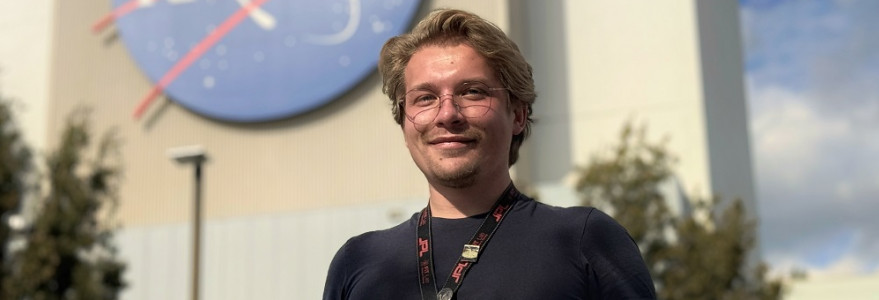Grzegorz Florczyk, who is preparing his doctoral thesis at the Faculty of Physics, the University of Warsaw, has been working for three months at the Jet Propulsion Laboratory, one of NASA’s research centres in Pasadena, California. He is working on the development of a new numerical model of the state of the lower troposphere, which takes into account the presence of pollutants such as particulate matter. The model could be used to study Earth, as well as other planets with dusty atmospheres.
Grzegorz Florczyk specialises in atmospheric physics. At the Institute of Geophysics at the UW’s Faculty of Physics, he is preparing his doctoral thesis under the supervision of Prof. Krzysztof Markowicz. For the past three months, he has been working at the Jet Propulsion Laboratory (JPL), one of the NASA’s research centres in Pasadena, California.
“The project I am doing as part of my internship at the NASA is closely related to the topic of my doctoral thesis,” Grzegorz Florczyk said.
The researcher is involved in developing a new numerical model describing the state of the lower troposphere, i.e. the planetary boundary layer investigating the effects that are associated with the presence of pollutants such as particulate matter.
“The model could be used not only to study Earth, which has been facing urban air quality problems for years, but also other planets with dusty atmospheres, such as Mars,” the scientist explains, adding, “The more space missions we send to other planets, the more data we collect about these distant worlds. The knowledge of atmospheres of planets can be used to improve our landing procedures in the future. It takes the expertise of people like me to analyse such data,” the NASA trainee said.
“A” for application
Grzegorz Florczyk admitted that he had not quite expected that as an atmospheric physicist he would ever find himself in a place like the NASA.
“The job is a dream that came true completely unexpectedly,” he admitted. “The basic application requirement for an internship at the Jet Propulsion Laboratory is to find a mentor from among the scientists working there. My supervisor, Prof. Krzysztof Markowicz, and I are doing joint research with Dr Marcin Witek, who works at the JPL. The idea came up that I should visit Marcin in California. This is how I received the invitation, which made the admission process much easier,” he said.
The application procedure started with the mentor issuing an advertisement in the laboratory’s internal system, in which he described a person who would be the best candidate for the intern position.
“Marcin recommended me and, after a few days, the laboratory contacted me via an e-mail to start the admission process,” Grzegorz Florczyk explained.
Among world-class specialists
“The atmosphere at the Jet Propulsion Laboratory stimulates scientific work. Many internal events are held here, which offers a great opportunity to meet other scientists, learn about their projects and establish potential collaborations,” Grzegorz Florczyk said.
He emphasised that the opportunity to consult world-class experts in any field incredibly accelerates the progress of scientific work: “For me, as a young physicist, the most important thing is to receive advice on how to function in the scientific world today.”
The resident scientists at the Jet Propulsion Laboratory come from all over the world: Denmark, Finland, France, Spain, India, Japan, Germany, Norway, Romania, Switzerland, Italy and the UK. Apart from Grzegorz, there is another Polish intern – Julia Stankiewicz.



